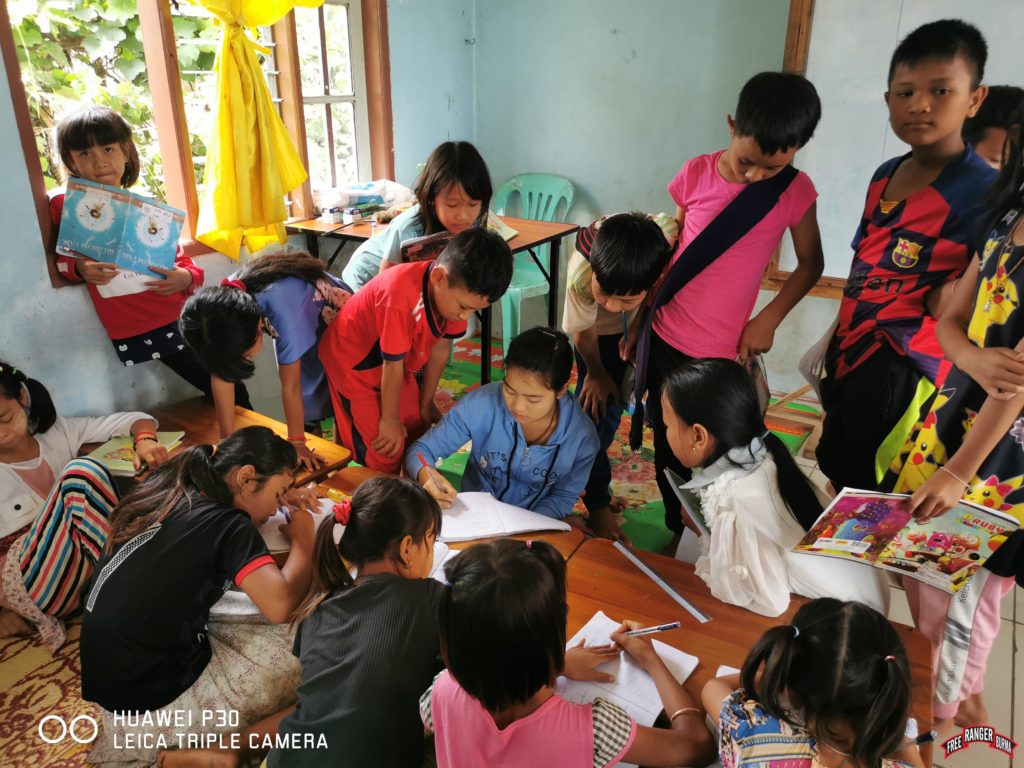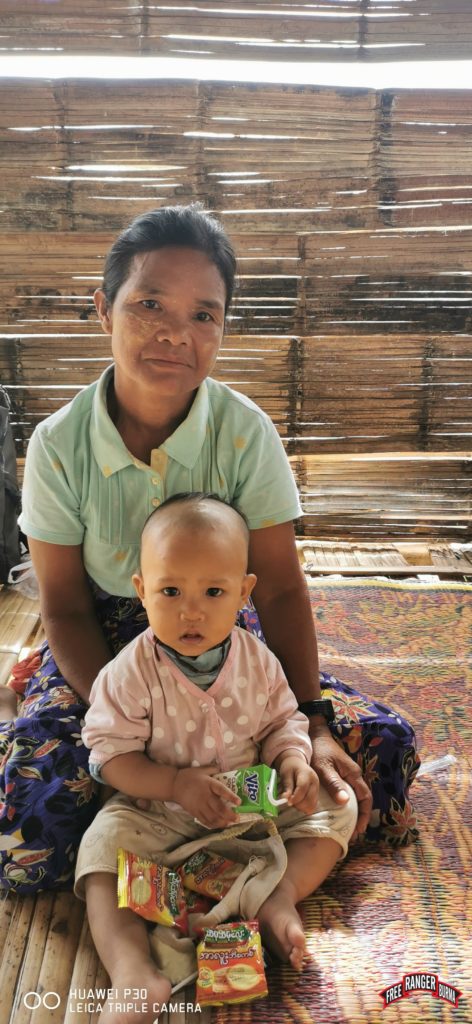FBR Relief Team Responds to Ongoing Displacement in Shan State
1 November 2022
Shan State, Burma
**Names changed for security purposes
The FBR Shan relief team entered the border region between Shan State and Karenni State on 15 June 2022. The goal of this mission was to reach those who were newly displaced by the fighting in northern Karenni State and to reconnect with those displaced in 2021 by the fighting in northern Shan State.
In total, the Shan relief team engaged with 2,997 IDPs of over 789 families. The team first visited a Buddhist temple on the southern Shan border. The temple currently houses 660 families, over 2,613 internally displaced people (IDPs), who arrived in May 2022. The ranger relief team provided the IDPs with food, school supplies, and encouragement. The team then went on to visit three other IDP camps in Shan State. These three camps were formed in June 2021 when fighting in northern Shan State intensified. The ranger teams have been in contact with and supporting these camps since their creation. The first camp they visited had 30 families and 104 people. They completed a GLC program, food distribution, and supported the teachers and schools. The second camp housed 77 families and 209 people. This camp has poor sanitation and is not in an ideal location for farming. The team provided food support and is planning to improve sanitation on their next mission. The third camp visited had 22 families and 71 people. This camp capitalized on the seeds the ranger team gave them last mission. They are growing eggplant, corn, beans, squash, and cucumber to supplement the food support they receive. The ranger team provided them with a GLC program, food support, encouragement, and even haircuts. In total the team distributed ฿286,439.00 baht in aid and ฿90,000.00 in medical relief to the IDPs in the region.
Nu, a member of FBR’s Shan relief team shares, “It was different this time.” Heavy fighting in the cities of Pekon, MoeBye, and Demoso has caused thousands to flee their homes. It was difficult to encounter the newly displaced; their sadness and loss were visible in their eyes. These newly displaced families joined the growing IDP population within Burma. The United Nations High Commissioner for Refugees (UNHCR) estimates that as of now there are over 50,000 IDPs in southern Shan State alone.
The team visited Waan Won Som, located on the northern border of Karenni State. In mid-May 2021, 660 households, over 2,613 people, sought sanctuary in the Buddhist temple of Waan Won Som. They fled the fighting between the Ethnic Armed Organizations and the Burma Army in northern Karenni State. Those displaced in May were made up of two distinct ethnic groups, Shan and Karenni. Those taking shelter in the temple are Shan Buddhists and the Karenni Christians are sheltering in a nearby village. The temple has constructed makeshift classrooms to support the education of those they house. There are currently nine teachers and 145 students ranging from kindergarten to 9th grade. The teachers interviewed asked most often for food, shelter, and clothing. However, the school would benefit from receiving school supplies, teaching materials, and teaching and student guidebooks.
The team also visited IDPs living in Waan Mai and Wo Long; these families were displaced in October 2021. At the beginning of their stay in the camp, they were living in tents of green tarps which aged and have now been replaced with tin roofs. Unfortunately, because the structures are too close together, the conditions are very hot and people cannot access water easily. They also have not been able to invest in sanitation. The IDPs still need to walk 15 minutes to retrieve the muddy water that then needs to be boiled to be potable.
After visiting the camps, Nu believes that the situation for all, especially the newly-displaced, in Shan State is dire. Those living as displaced people are pulled between two things: the desire and belief that one day they will return home and the reality of needing to live in an environment that is not their home. This makes it difficult to invest in their lives in the IDP camp. Nu says “They miss their home. They don’t want to build a new home, they want to return to their homes. They can’t, so instead, they invest in temporary things so they can survive the wait to return home.”
Nu is very concerned with the education system within the camps. The education system is supported solely by the villagers and the temple. The students in this area are not receiving government assistance like children in other parts of Burma. In most cases, the teachers are graduates of the system in which they now teach. Nu believes that in order to improve the system the education of teachers needs to improve. To immediately address the issue she believes teaching guides and student books for all grade levels would help.
For some, the trauma of displacement and the encounters with the Burma Army continue to affect their daily lives. Nu completed four interviews and noticed that most villagers expressed fear when recounting their experiences. A woman named Nang Hsa cannot stand the sound of loud noises and has to fight the urge to flee to escape the sound. As each interview began, most of the people she spoke to had smiles that quickly faded to solemn expressions and tears. When speaking to them about their homes and what they had lost it was difficult for Nu not to cry with them. “The IDPs in Shan State are destitute and are exhausted; they need support from outside of Burma.” Nu said that speaking with IDPs was difficult because it was apparent that they, especially the young adults, had lost hope. They have no opportunity for work, education, farming, or to establish a home or business. Some of these young adults are fleeing across the border to Thailand, leaving their families in the camp. She interviewed students at Waan Pong School and, “each student believed they have no future. They believed that the only solution was to flee to Thailand to work. Their only option was to leave their loved ones in the camp to search for work.”
Thank you and God bless you,
Free Burma Rangers
Below is the link to Nu’s Full Report:



